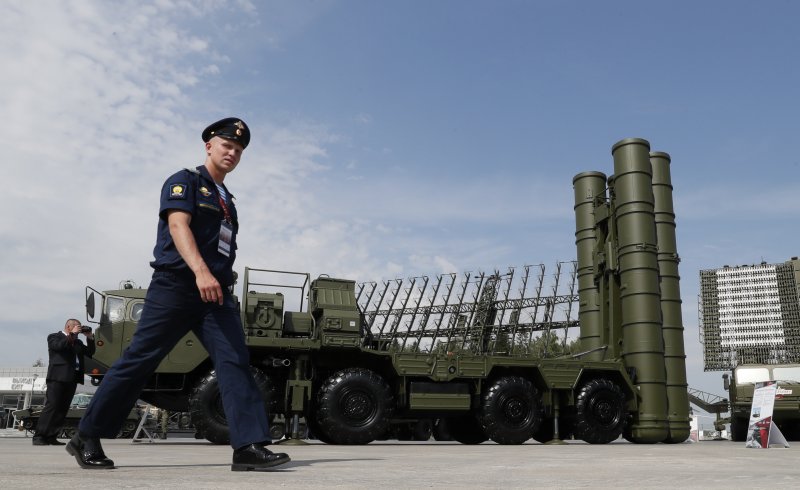The United States ended Turkey's partnership in the F-35 fighter jet program over its acceptance of delivery of the S-400 'Triumph' anti-aircraft missile system. Photo by Yuri Kochetkov/EPA-EFE
July 18 (UPI) -- The United States confirmed it has removed Turkey from its F-35 fighter jet program after it received delivery of a Russian missile defense system last week.
After the decision Wednesday, Rostec state corporation said it is ready to supply Su-35 fighter jets to Turkey if desired, according to the conglomerate's leader, Sergei Chemezov.
A Turkish military source told state-run Sputnik news: "It is still premature to talk about Turkey's purchase of Russian Su-35 fighters. Our president will assess this important topic. He will also make a statement."
Turkey received its first shipment of the $2.5 billion S-400 surface-to-air missile system Friday, which the United States had threatened against with sanctions and nullification of a deal that would see the Eastern European country purchase more than 100 U.S.-made F-35 jets.
On Tuesday, President Donald Trump officially canceled Turkey's order.
"Unfortunately, Turkey's decision to purchase Russian S-400 air defense systems renders its continued involvement with the F-35 impossible," the White House said in a statement Wednesday. "The F-35 cannot coexist with a Russian intelligence-collection platform that will be used to learn about its advanced capabilities."
There will be "detrimental impacts" to Turkey's relations with the NATO Alliance, the White House said, while adding the United States maintains a strong relationship with the country that isn't solely dependent on the sale of the fighter jets.
Under Secretary of Defense for Sustainment Ellen Lord said Wednesday in a press briefing that Turkey cannot have a Russian intelligence collecting system close to where the F-35 is stored and maintained as its strength comes from its secret stealth technologies.
The United States has previously said one of the issues with Turkey having the S-400 system is that Russia may gain access to U.S. military secrets.
"We seek only to protect the long-term security of the F-35 program," she said. "In early June, the acting secretary of defense communicated to [Defense] Minister [Hulusi] Akar that unless Turkey canceled acceptance of this system, Turkey would be removed from the F-35 program."
She said the United States and its other F-35 partners are in agreement on the decision to suspend Turkey from the program and that its removal will have "minimal impact" on its other partners as it was prepared for this possibility.
Turkey's Foreign Ministry said the decision to remove it from the F-35 program "contradicts with the spirit of the alliance" and lacks justification.
"It is not fair to remove Turkey, a main partner, from the F-35 program and also the claim that S-400 system would jeopardize the F-35s is baseless," it said in a statement, while calling on the United States "to return from this mistake that will cause irreparable wounds in our strategic relations."
In April, Mevlut Cavusoglu, Turkey's foreign minister, said his nation would look for an advanced fighter if the United States refused to sell the F-35.
"We are already partners in the F-35 manufacturing program, we participate in this project, we have paid the necessary amount. There are currently no problems with this," he said. "But in a worst case scenario, we will have to satisfy our need in another place, where the best technologies will be offered."
On Thursday, Rostec's Chemezov was quoted in state-run TASS: "If our Turkish colleagues express an interest, we are ready to discuss the deliveries of Su-35."
The Su-35S fourth-generation supersonic fighter jet is a derivative of the Su-27 plane. It performed its debut flight in 2008.
In 2015, China became the first foreign buyer of Su-35, agreeing to pay $2.5 billion on the deliveries of 24 fighter jets as well as ground equipment and reserve engines.
Russia is also to deliver to Indonesia the first of 11 fighters jets this year.
The Pentagon halted the shipment of F-35 planes to Turkey in early April. Turkey was expecting the first of the $90 million jets to arrive in November.
Fourteen countries participate in the F-35 program, including parts.
The Pentagon is searching for alternate vendors to replace companies in Turkey.
Eight Turkish companies make parts for the fuselage, landing gear and cockpit displays of the aircraft, according to Lockheed Martin, which is the primary airframe builder. Pratt & Whitney manufactures the propulsion system.
Lord said the decision to cancel its partnership with the F-35 will cost Turkey jobs and economic opportunities as it will no longer be responsible for manufacturing over 900 parts for the F-35 at more than $1 billion across 10 Turkish supplies.
However, she reiterated that the United States attempted to work with Turkey for it to use its U.S. Patriot missile defense system and despite its removal from the F-35 program the alliance between the two countries and between Turkey and NATO is strong.
"Let me reiterate that Turkey remains a close NATO ally and our military-to-military relationship remains strong," she said. "We continue to honour our commitment to ensure the safety of our NATO ally and support missions benefiting regional security and stability."
Meanwhile, Turkey received its 15th shipment of S-400 components Thursday, Turkey's state-run Anadolu Agency reported.















